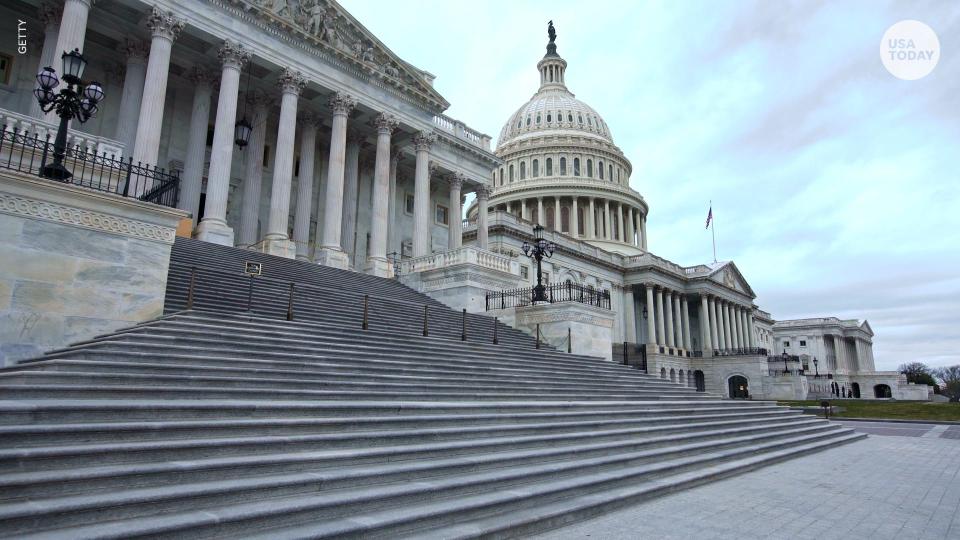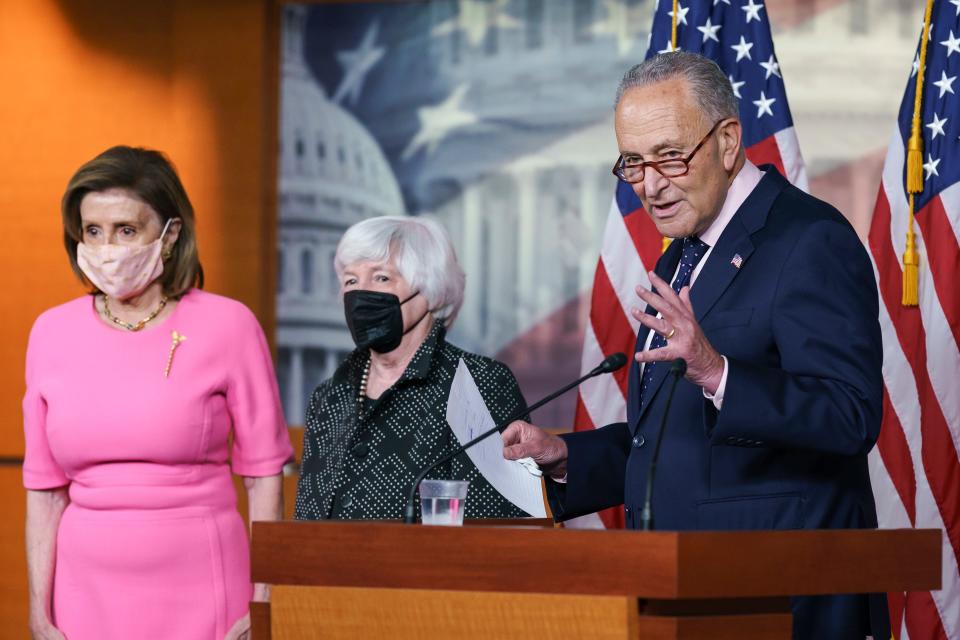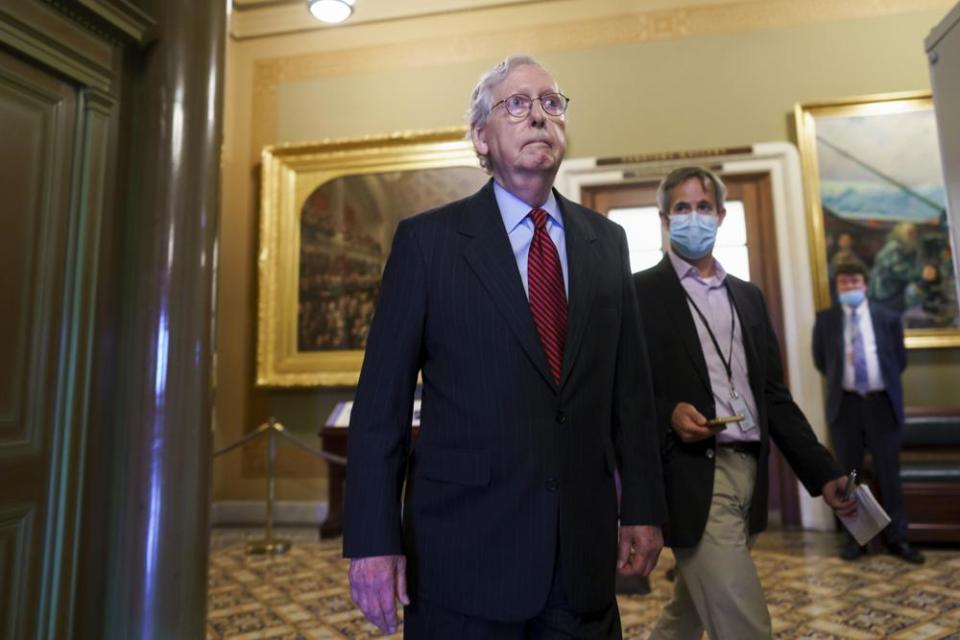Congress is weeks away from a debt crisis that could lead to default. Is it time to panic?
- Oops!Something went wrong.Please try again later.
WASHINGTON – The federal government's borrowing authority expires in mid-October, but there's no reason to panic, right?
Lawmakers have raised the debt ceiling more than a dozen times in the past 20 years, and it'll be easier this go-round because one party – Democrats – controls the White House and Congress.
Yet this feels different.
The looming debt limit expiration arrives as Congress scrambles to avoid a partial government shutdown that will happen if a temporary spending bill doesn't pass by midnight Thursday. Democrats have focused on other consequential funding measures (a $1.2 trillion infrastructure bill and a $3.5 trillion reconciliation budget bill) that have been slowed by disputes between liberals and moderates. GOP Senate leaders declared they have no intention of helping Democrats solve the potential crisis.

The Obama White House and fiscal hawks in the GOP-controlled House narrowly avoided a default in 2011 when they struck an 11th-hour deal to raise the debt ceiling.
The brinkmanship had consequences: The stock market turned volatile, bond prices rose, and the rating agency Standard & Poor’s downgraded the U.S. AAA credit rating for the first time in history. The Government Accountability Office estimated that "delays in raising the debt limit in 2011 led to an increase in Treasury’s borrowing costs of about $1.3 billion in fiscal year 2011."
A bipartisan compromise known as the Budget Control Act led to across-the-board budget cuts known as sequestration for several years.
Who controls the debt ceiling?
“Failing to pay the bills America owes would hurt our economy, raise mortgage and borrowing costs and threaten payments for Social Security recipients, veterans and others,” said Sen. Tim Kaine, D-Va., co-sponsor of a bill that would essentially transfer the authority to raise the debt ceiling from Congress to the White House.
"This is playing with fire," Senate Majority Leader Chuck Schumer, D-N.Y., said last week shortly before the House passed a bill along party lines that would suspend the debt ceiling and give negotiators more time to work out a longer solution. The bill goes to the Senate, where it would be in deep peril if a single Republican decides to filibuster the measure.

For decades, Congress has put limits on how much the federal government can borrow to finance budget deficits and to meet federal obligations. For the better part of the past century, lawmakers approved modest raises to the debt ceiling with little fanfare. That began to change with Republican Speaker Newt Gingrich in the mid-'90s as fights over spending and taxes grew more partisan and the debt went from less than $6 trillion in 2001 to nearly $29 trillion today.
The executive branch has some flexibility to stretch out the government's capability to manage its debt. But Treasury Secretary Janet Yellen told lawmakers earlier this month that "cash and extraordinary measures will be exhausted during the month of October."
'Make the other side take the hard vote'
House Speaker Nancy Pelosi, D-Calif., and Schumer accuse Republicans of being irresponsible after Democrats helped raise the debt limit three times during the Trump administration, including a sweeping tax bill cut in 2017 that added $1.9 trillion to the deficit over 10 years.
Republicans rarely objected to increasing debt under Trump, who pledged during the 2016 campaign that he would be able to eliminate the debt – then around $19 trillion – “over a period of eight years.” It was $27.8 trillion when Trump left office.

Now Senate GOP Leader Mitch McConnell is holding firm, saying Republicans have been shut out of budget negotiations, including the "reckless taxing and spending" proposals Democrats are trying to pass.
"The debt ceiling will be raised as it always should be," McConnell told reporters this week. "But it will be raised by the Democrats."
The Committee for a Responsible Federal Budget, a nonpartisan organization advocating for fiscal accountability, is urging Congress to "absolutely" suspend or increase the debt ceiling.
More: 'Playing with fire': Democrats, Republicans on a collision course over debt limit, spending
"But it's more than a little ironic that discussions of raising the debt limit are happening the same time that Congress is trying to pass a bipartisan infrastructure bill that would borrow $400 billion and a reconciliation bill that is shaping up to include far more than the targeted $3.5 trillion worth of policies," spokeswoman Kim McIntyre said.
Philip Wallach, a senior fellow at the American Enterprise Institute, shares McConnell's assessment that Congress will avert this latest crisis. While Republicans are being blamed for being obstructionists, Wallach said, Democrats (including then-Sen. Barack Obama in 2006) have opposed raising the debt limit too.
"It's always been a thing that the parties have played politics over," Wallach said. "It's always been seen as a hard vote. And if you're in the minority, you feel like: 'Make the other side take the hard vote.'"
Wallach expects Congress to avoid a default and noted that there's no panic exhibited by the bond markets, which are sensitive to the prospect of default. This is more of a political clash in which Republicans heading into the midterm elections next year want to pin rapidly increasing debt and rising inflation to President Joe Biden and Democrats in Congress, he said.
"And if they get a month's worth of high-anxiety media coverage that allows them to insert that message and get it out there to the American people, I think they may chalk that up as a victory," Wallach said, "even if in the end they don't really get that much in the way of policy concessions."
This article originally appeared on USA TODAY: Debt ceiling is always raised by Congress - or is it? Default looms


